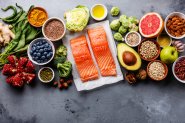Advertising Disclosure
7 food label promises that aren’t as healthy as they sound

Whether you’re on a diet or are a health-conscious person in general, it’s likely that you care to know what’s in your food. And you’re interested in making the best choices possible when deciding what and what not to eat. One of the first ways we go about achieving this is by reading the labels on our food. But this is not always the best way to make these decisions. One reason why is because there are so many misleading food labels that sound healthy but aren’t. Some mislead you to convince you to buy the product. Others are technically true but ultimately meaningless. These labels become more and more ubiquitous as the desire grows for what they promise. And they may be leading you to believe you’re making healthful choices when you in fact are not.
Misleading food labels: Reduced fat
This one seems healthy because less fat means healthier, right? No, not always. In some cases less fat is healthier. But in many processed foods, the manufacturer simply replaces the fat with other unhealthy ingredients. Besides, “reduced fat” only means the product contains 25% less fat than the regular version. So a “reduced fat” product could still be high in fat. Further, “reduced fat” does not always mean lower in calories. This is because sugar and often replaces fat in these products to make up for flavor loss due to the fat reduction.
Misleading food labels: Cholesterol-free
High blood cholesterol can be harmful to your health. But cholesterol itself is a necessary part of a healthy diet. And it plays a critical role in the building of cells. So opting for foods that claim to be “cholesterol free” is not always as healthy as it sounds.
Also, many consumers believe that if something is cholesterol-free, it’s also fat-free. They’re wrong. Some cooking oils are cholesterol-free, but are 100% fat. Examples include saturated and trans fats which are worse for your heart and general health than a high level of cholesterol. And foods that are cholesterol-free by nature often advertise themselves as such to seem healthier. But they may not be a healthy choice.
Misleading food labels: With added vitamins
Foods fortified with A, B, C, and E vitamins have become popular. Many consumers think these products are healthier than equivalent products that aren’t fortified. A cereal labeled to have vitamins added may lead you to believe that it has the same health benefits as a plateful of fruits and veggies. It doesn’t.
The truth is that taking vitamins from a food in which they occur by nature is still more nutritious than adding them to food in which they don’t. And if you already get the vitamins you need from your diet, eating fortified foods may cause you to ingest too much of certain vitamins. That can do more harm than good.
Misleading food label: Whole grains
It’s true that wole grains are good for you. But that fact has led to an enormous proliferation of “made with whole grains” food labels. But those labels are almost totally meaningless. Why? The problem with this label is that the Whole Grains Council invented it. And it doesn’t mean that all grains in the food are whole grains. By definition, a product with the “whole grain” stamp on it has to include only 8 grams of whole grains per serving. The rest of the ingredients may lead to the product being high in sugar, butter and processed foods. So it may be higher in calories than foods not labeled “made with whole grains.” Unless it contains 100% whole grain wheat, you’re not likely getting the benefits you’re looking for.
Misleading food label: All-natural
Natural is almost always associated with healthy, and companies know this. Most of us would reach for something labeled “all natural” over an item right next to it on the shelf without the label. But this label is misleading for several reasons and does not actually mean that the product is healthy or good for you.
First off, the Food and Drug Administration does not define “all natural,” meaning that the regulations for foods labeled as such are pretty loose, stating only that they can not contain artificial ingredients or preservatives and that the ingredients it does contain underwent minimal processing. This means that almost anything can get away with an “all natural” label but still contain plenty of ingredients that are harmful to your health. Also, there are plenty of natural ingredients that are bad for you, natural though they may be. So grabbing something labeled “all natural” without looking at what is actually in it may not get you what you are actually looking for.
Misleading label: Plant-based
As plant-based diets become more popular, so does labeling foods as such to make them seem healthier, but the label doesn’t often mean much, and being plant based isn’t always equated with being healthy or good for you. One problem with this label is due to the fact that there is not a standard definition of what “plant-based” means so it’s used to mean different things. Another problem is the fact that many ingredients that come from plants are not good for you, for example, sugar. “Plant-based” is more a lackluster way to tell you what’s not in the product than a way to say what is, and much of what may be in these products are highly-processed ingredients added to make up for the lack of flavor from butter and other animal products.
Misleading label: Zero calories
This label is one that many people who are watching their weight or calorie-conscious may find themselves reaching for, but it is misleading for a few reasons. The first of these reasons is that fact that the FDA says that food companies can be up to 20% off on the calorie count of the product, thus they can label something as zero calorie that actually is not. Also, a food or drink being calorie-free in no way means that it is healthy. For example, a diet soda that is calorie free is full of artificial sweeteners along with other additives and chemicals. These ingredients are likely worse for you in the long run than a few extra calories.
The bottom line is that you should not take food labels at face value and instead should take care to read the labels to see what the ingredients actually are and make an educated decision in place of falling for false marketing.





